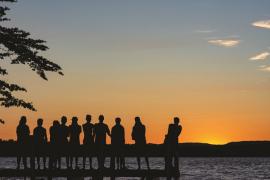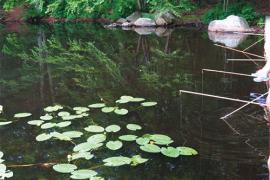Wondering what type of mental health professional might be a good fit for your camp’s needs?
Interested in knowing what this professional needs to be successful?
Concerned about having a mental health professional when those services aren’t the focus of your camp?
These and other questions pepper conversations about the need for camp professionals to effectively navigate the mental, emotional, and social health (MESH) terrain of campers and staff. According to an autumn 2018 ACA member survey conducted by ACA’s Healthy Camps Committee, 98 percent of over 400 respondents indicated that MESH concerns were the same or greater during the 2018 summer season than the prior season. Interestingly, that’s the same response received on the 2015 survey — and no one expects it to change in the future. MESH concerns are here to stay. Perhaps we’re finally recognizing that people have a MESH profile just as they have a physical health profile, and we have to pay attention to that.
Increasingly, camp professionals are turning to mental health professionals to help navigate the MESH area. It’s certainly needed when an individual has a MESH crisis at camp but, more importantly, camp professionals are interested in shaping their programs, facilities, and policies to minimize the potential for MESH flare-ups while capitalizing on the growth potential inherent to the camp experience.
This resiliency stance often means having access to a MESH professional. But how do you develop that relationship effectively? And how might you define the professional’s role so it complements your camp mission and policies?
Some MESH Basics
A starting point is understanding that MESH needs of campers, staff, and camp as a community exist along a continuum (Figure 1). Most people have a natural "home" point on the continuum and fluctuate as they experience good and not-so-good days. The same is true for the MESH profile of the camp community. In addition, home points often vary from person to person. We know individuals with robust, resilient MESH profiles who seem to consistently function toward the optimal end, and we know people who aren’t as resilient or robust. The point is to understand that some fluctuation from that home point is normal to the human experience. However, it can be aberrant when there’s too much deviation from the expected.
In addition, an individual’s MESH profile can change over time. There’s day-to-day variance, but there’s also variance as people grow and gather life experiences. The same holds true for an entire camp. The camp’s MESH profile on opening day is different from that of closing day, and that can change with events such as new owners or leadership. Consequently, MESH enjoys a dynamic quality, and an individual’s MESH profile is not necessarily the same as the group’s MESH profile.
Also note that there’s a difference between MESH behavior associated with a person’s developmental stage and MESH pathology. Take, for example, the new eight-year-old camper whose significant sobbing is peppered with angry shouts of "I want to go home!" Learning how to cope with separation from one’s known security base is a learned behavior appropriate for youngsters. While we may understand the sobbing and pleas from the eight-year-old, we may come to a different opinion should those same behaviors be demonstrated by a 15-year-old.
Sometimes the camp experience itself gets in the way of someone’s at-home MESH profile. The way campers live at camp is often quite different from the way they live at home. For example, at camp they can expect:
- To talk with and accept things from strangers (aka: camp staff) when they would never do that at home
- Undress in front of others, again something they are taught not to do
- Hear night sounds like spring peepers, a branch scraping the cabin roof, and wildlife scrambling through the woods, all alien in many urban settings
- Enjoy light from the stars when street and yard lights are common at home
While camp folks thoroughly enjoy these, youth unfamiliar with camp may find the experiences unsettling. Now imagine if that same person is also coping with a MESH concern.
Because of factors such as these, a growing number of camp professionals are expanding their essential eligibility criteria for campers as well as the essential functions for staff to include a MESH statement, for example: "Capable of developmentally appropriate and sustained interaction with others in our youth-centered, changing, and outdoor program."
The Scope of MESH Service Needed
Understanding the basics lays the groundwork to determine the scope of MESH services needed for your camp, something that’s colored by the expertise of leadership, the type of camper served, and the program’s core elements. In other words, determining scope begins with the camp’s mission statement. From the mission, a camp’s core program is developed, those elements that all campers experience. These core elements have implications for a person’s MESH profile. Must all campers be able to express their needs? Effectively interact with others? Be comfortable with last-minute changes to the schedule? Withstand the effort of rigorous trail experiences? Identifying these helps you determine the necessary MESH profile of participants (including staff).
The scope of MESH is also influenced by the regulations and policies your camp must follow and the reality of its staff. While regulations and policies flow from overseeing entities — the state, a board of directors, and so forth — the last point is crucial because most camp staff are still studying. They aren’t professionals. Tactfully remind parents of this while assuring them that staff supervisors are skilled and provide appropriate supervision.
Some camps truly strive to be as inclusive as possible; any child who wants to attend is accepted. Others camps are more circumspect, recognizing their capabilities in some areas but also their limitations (e.g., geography, staff skills, program limitations). The wisdom is to determine the scope of your camp’s MESH service while keeping in mind the distinction between what you need and what you want. Doing so includes deciding if your MESH professional must be at camp all the time, available for consult only when called by the director, or any of several options in between. Select what best fits your needs while also considering plan B if you’re unable to find that desired option.
Remember that communicating this information to parents and staff is as important as figuring it out.
Developing Your MESH Professional’s Role
Once you’ve determined the scope of needed MESH support, the next step is to consider what the camp can provide, offer, and ask of a MESH professional. Think of this as a job description. Consider:
- How the professional gets oriented. Who does this and when?
- Who can contact the professional with questions or concerns?
- How is this contact initiated — via phone, text, email?
- What’s the professional’s response time to requests?
- What dollars are available as salary or, perhaps, retainer?
- What benefits might the camp offer (e.g., camper scholarship, access to camp facilities)?
- Describe the tasks you need the professional to do/accomplish; what are their responsibilities?
- Do those tasks include contacting parents? If so, must the director be consulted first?
- Who supervises this professional? Describe the supervisory process.
- What records must the professional maintain? Where are those records kept and who owns them?
- Consider privacy and confidentiality. Who is told what by the professional?
Choosing a MESH Professional
Now it’s time to get explicit. Knowing the scope of service needed and what your camp can provide and ask of the professional means it’s time to target the person best suited to meet those needs. Consider their skill set, their previous experience working with youth, and their understanding of the camp experience. Go into this hoping to find a person who, assuming all works out, can work more than one summer. Perhaps there’s a parent or two who might be interested? Maybe it’s a board member or someone from the local community?
Several career options focus on MESH. Table 1 provides an overview of these. The chart includes explanations of educational preparation and comments regarding the credential’s "fit" to camp. But it’s not exhaustive and may need adaptation based on state regulations and/or camp policy. In addition, some of these people have a professional practice that may limit their availability during your season, so be ready with plan B if your first option doesn’t work out.
When doing this search, involve returning staff. They understand the kind of person who’d be a good fit and may know someone. Also consult local professionals; they have connections or may be interested in the job. Talk with colleges/universities that provide graduate programs in these careers; experience at your camp may fit into the professional development plan of emerging professionals and bring access to their faculty as well. Contact state affiliates of national organizations such as the American School Counselor Association (schoolcounselor.org) and the National Association of Social Workers (socialworkers.org). Using the state affiliate typically means that members have the appropriate license needed to practice.
Your MESH professional needs your attention just as any other staff member. Indeed, their success is often predicated on that attention. Orient them, be ready to reorient them, coach them through their first (and maybe second) interaction with a camper or staff member, discuss that outcome, and review record-keeping processes. Once they have a bit of experience, revisit their job description and ask what suggestions they have to improve it. The goal is to increase both their job satisfaction and their connection with camp. This takes intention and attention by someone, but it also pays off down the proverbial road.
As ACA’s Healthy Camps surveys have demonstrated, our camp community is developing and improving relationships with MESH professionals. As one camp professional stated: "It’s easy to care for the bleeding and throwing up. It’s a lot tougher to deal with what’s going on between the ears." And while a growing number of us are taking courses such as Mental Health First Aid, we’re also learning that there’s more to the MESH profile of campers, staff, and camp itself than we ever realized. That means we’re continuing to learn, so continue to talk with one another and share ideas. Our entire camp community will be better for that.
NOTE: Markel is a proud supporter of the Healthy Camp Monitoring and Education Program.
Reference
American Camp Association. (2018). Healthy camps committee member survey. Martinsville, IN: American Camp Association.
Linda Ebner Erceg, RN, MS, PHN, is the program coordinator for Bemidji State University’s Certificate in Camp Nursing (MN). Her experience includes more than 30 years as a year-round camp nurse for Concordia Language Villages and deep experience in working with camp professionals to address camp health needs. She currently chairs ACA’s Healthy Camps committee where her time at camp as well as her former role as executive director for the Association of Camp Nursing now contribute to her educational and research activities.


